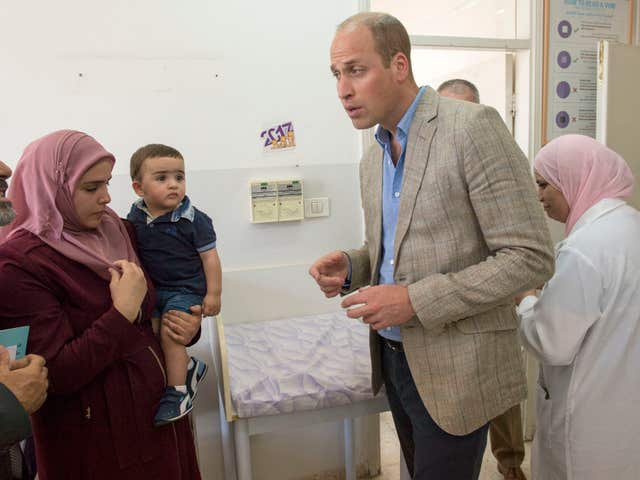
The Duke of Cambridge was clapped and cheered by Palestinians as he made his first visit to a refugee camp to learn about the lives of Arabs on the West Bank.
After meeting Palestinian leader Mahmoud Abbas in Ramallah, he travelled a few miles away to the streets of Jalazone camp to visit a school and health clinic.
The camp first opened in the wake of the 1948 Arab-Israeli war but today the tents have given way to concrete buildings built along rough-hewn streets and pavements.

It is home to around 15,000 residents where unemployment is high and violent clashes between Palestinians and a neighbouring Israeli settlement and its forces are a regular occurrence.
Dozens of young men had gathered outside the medical centre and lined the street waiting for the duke to leave and held up smartphones to capture his first visit to the Occupied Palestinian Territories.
When he emerged they clapped and cheered the royal who walked around 50 metres along the street’s rough surface looking around at the shops and homes.
Inside the medical centre William had shown off his maternal instincts when he met a group of Palestinian refugee mothers having their young babies vaccinated.
At Jalazone Refugee Camp in Ramallah, The Duke of Cambridge meets staff, patients and families involved in @UNRWA's Child Vaccination programme. pic.twitter.com/MfW7Sv5nUV
— Kensington Palace (@KensingtonRoyal) June 27, 2018
With his third child Prince Louis around the same age as the babies being cradled by their mothers, the second in line to the throne could not help cooing over one-month-old Naifa as she was given her jabs.
“So tiny to have injections” the royal father said as the doctor performed the procedure and the infant began to cry, adding: “Is it always in the legs?”
Her mother Suhair Moussa was questioned by William, through an interpreter, and he looked surprised when he asked if it was her first child and she replied it was her fifth.
Later William went to a Palestinian street festival where even the cultural dances and songs had a subtle political message.
The visit was billed as an opportunity for the duke to experience Palestinian culture, an antidote to the images of violence and unrest the world normally sees of Ramallah.
But organisers ensured the dance and musical performances he watched spoke about cultural identity and its importance.
He watched a group of musicians, Al Kamandjati, perform a song by the Lebanese singer Fairuz, and a performance by the traditional Dabkeh singers.
A member of the audience explained that the song, Homeland, was “a mellow patriotic song about the relationship between Palestinians and their homeland, which says they have been here not for 100 years, not for 1,000 years, but from the beginning of time”.
The audience member said that even the dancers in their traditional Palestinian costumes carried a message, adding: “It is very symbolic. It says, ‘We have a strong culture, we belong here’.”
The duke arrived at the street festival to be greeted by a sound system playing Land of Hope and Glory and a fountain shooting water 30 feet into the air.
He was welcomed by the Mayor of Ramallah, Musa Hadid, and shown a statue of Rashid Haddadin, the Christian Sheikh who founded Ramallah in the sixteenth century.
At the musical performance, the mayor said: “By international standards we are small in size, but we make up for that with our big welcoming heart.”
On a tour of market stalls, the duke tried falafel, pastries and ice cream, and was given a personalised handbag to take home for his wife.
Ziad Hussary, 35, who gave him some bread with falafel and tahini, said: “I told him it was traditional food from here in Palestine. He said it was very good and tasty.”
He also tried some ice cream from a stall run by Jimmy Rukab, 36, whose family has run an ice cream business since 1941.
He said: “I think it’s awesome to have someone from the royal family visiting us here with a message of peace to both sides, and to have him experience Ramallah and walk among the people. Usually people have a bad image of us.
“I am a great fan of him. He is a prince! I have always liked the royal family. I have been to Buckingham Palace, I loved it.”
While many Palestinians are critical of the role played by Britain in the history of the Israeli-Palestinian conflict, he said: “Britain has played a part in the peace process. They have been helping the Palestinian people a lot. There are programmes from the British Council.”
Asked if the duke’s visit would make any difference, he said: “I hope so. I want to look at it as a glass half full.”
Carmen Saadeh, 50, a handbag designer, gave William a clutch bag made of olive wood engraved with the name of the Duchess of Cambridge and, more informally, “Kate”.
She said: “It is a symbol of our land, and a symbol of peace. He liked it very much.”


Comments: Our rules
We want our comments to be a lively and valuable part of our community - a place where readers can debate and engage with the most important local issues. The ability to comment on our stories is a privilege, not a right, however, and that privilege may be withdrawn if it is abused or misused.
Please report any comments that break our rules.
Read the rules here